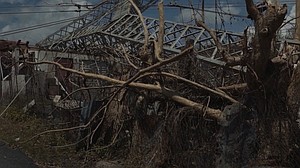9/26/2017

By Betsy Klein, CNN
(CNN) -- President Donald Trump vowed Tuesday that federal assistance is on its way to Puerto Rico, a day after he commented for the first time in days about the devastation caused by Hurricane Maria since it made landfall on the US territory.
"Thank you to Carmen Yulín Cruz, the Mayor of San Juan, for your kind words on FEMA etc. We are working hard. Much food and water there/on way," he wrote on Twitter Tuesday morning, moments after Yulín Cruz appeared on CNN's "New Day."
Sharing harrowing details of rescue efforts in her city, Yulín Cruz praised the Federal Emergency Management Agency's "great job" and "logistics help."
"Our bodies are so tired, but our souls are so full of strength that we will get to everyone we can get to," she said.
Maria made landfall on Puerto Rico last week, whipping the island with Irma-level winds, drenching it in Harvey-level flooding, crippling communications, decimating buildings and damaging a dam that puts downstream residents at risk of catastrophe. Without power and communications for much of the island, millions of people have been cut off from the world since the hurricane hit.
After days of public silence on the hurricane, Trump tweeted criticism Monday evening, casting blame on the island's poor infrastructure and economic instability.
"Texas & Florida are doing great but Puerto Rico, which was already suffering from broken infrastructure & massive debt, is in deep trouble. It's old electrical grid, which was in terrible shape, was devastated. Much of the Island was destroyed, with billions of dollars owed to Wall Street and the banks which, sadly, must be dealt with. Food, water and medical are top priorities - and doing well. #FEMA," he wrote in a series of tweets.
Responding Tuesday, Yulín Cruz said, "These are two different topics. One topic is the massive debt, which we know we have and it's been dealt with. But you don't put debt above people, you put people above debt."
Trump himself has vowed to travel to Puerto Rico, as he did in the immediate aftermath of storms in Texas and Florida, but officials say the devastated territory is not yet capable of hosting a presidential visit.
Asked about a potential visit from the President, Yulín Cruz defended Trump and emphasized the need for federal funding.
"I am sure that as the United States President, you know, he can come to Puerto Rico if he wants to. He has been not only tweeting, but I know he has been in contact with the governor, and we appreciate that. Let's make sure that this is not a handout, this is a moral imperative, and it is a plea for help and it a plea for us to be done right," she said.
The President is scheduled to receive a briefing on hurricane recovery efforts from homeland security adviser Tom Bossert later Tuesday morning. Bossert traveled to Puerto Rico alongside FEMA Administrator Brock Long on Monday to assess damage and federal needs.
The administration has not yet sent a disaster spending request to Congress, and it's not clear whether Bossert will have a fixed dollar amount to present to the President during his Tuesday briefing.
As of Monday morning, FEMA had $5.03 billion available for disaster spending between now and the end of September, an agency spokesperson told CNN. When the new federal fiscal year begins on October 1, the disaster relief fund will be replenished with an additional $6.7 billion.
Two senior House GOP sources tell CNN they expect to get the official request from the Trump administration in mid-October. A senior administration official says that is the White House's expected timing as well.
Defending the federal response in Puerto Rico as "anything but slow" Monday, White House press secretary Sarah Sanders said the administration will be able to determine appropriate funds "once we have a greater insight into the full assessment of damage."
Puerto Rico Gov. Ricardo Rosselló said on CNN Monday that the US commonwealth faces a humanitarian crisis, urging Congress to provide an aid package.
"We need something tangible, a bill that actually answers to our need right now," he said. "Otherwise, there will be ... a massive exodus to the (mainland) United States."
